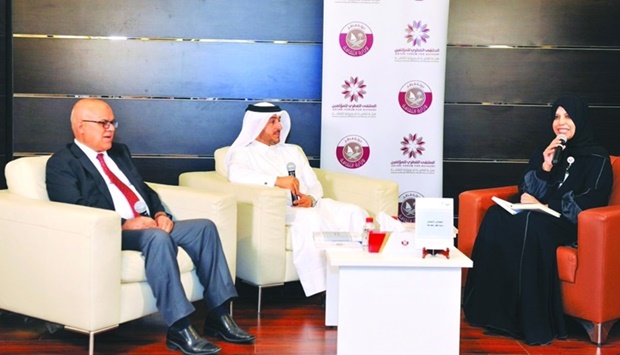The Ministry of Culture, represented by the Qatari Forum for Authors, organised on Tuesday a special ceremony to launch the book entitled 'Development Cooperation.. The State of Qatar as Model' issued by the Diplomatic Institute of the Ministry of Foreign Affairs.
The book was co-authored by HE Ambassador Dr Abdulaziz bin Mohamed al-Horr and Dr Nawzad Abdul-Rahamn al-Hiti.
The session that was chaired by Maryam Yassin al-Hammadi, Director of the Department of Culture and Arts at the Ministry of Culture, dealt with the book's content, including the role played by Qatar in aiding Islamic countries, particularly poor countries to further implement the plans and programmes of mitigating poverty and hunger, disseminate good education, expand health care services and build the infrastructures of roads, bridges and power generation plants and safe drinking water plants.
Dr al-Horr said the idea of the book came from the volume of aid and development co-operation offered by Qatar to numerous countries worldwide, pointing out that the idea is largely based on the qualities of medium- and long-term aid, indicating that the book documented the development co-operation during the course of history among the governmental and non-governmental organisations in Qatar to monitor the development co-operation, emphasising that such co-operation has virtually impacted the countries and the various strata which had benefited from this co-operation.
For his part, Dr al-Hiti said that the book reviews the inception and evolution of the international development co-operation, in addition to elucidating the development situations in the Islamic countries, including the institutional framework of co-operation within the framework of the Organisation of Islamic Co-operation (OIC).
In addition, the 240-page book was divided into three chapters, the first of which addresses the overview of international development cooperation in terms of inception and institutional framework both at the global and OIC levels, adding that the second chapter focused on studying the economic and development conditions in Islamic countries, while the third chapter focused on reviewing the role played by Qatar in providing development aid to Islamic countries, which enabled them to help achieve some of the Millennium Development Goals, and enable them to prepare effectively to achieve the agenda of the UN Sustainable Development 2030.
The book was co-authored by HE Ambassador Dr Abdulaziz bin Mohamed al-Horr and Dr Nawzad Abdul-Rahamn al-Hiti.
The session that was chaired by Maryam Yassin al-Hammadi, Director of the Department of Culture and Arts at the Ministry of Culture, dealt with the book's content, including the role played by Qatar in aiding Islamic countries, particularly poor countries to further implement the plans and programmes of mitigating poverty and hunger, disseminate good education, expand health care services and build the infrastructures of roads, bridges and power generation plants and safe drinking water plants.
Dr al-Horr said the idea of the book came from the volume of aid and development co-operation offered by Qatar to numerous countries worldwide, pointing out that the idea is largely based on the qualities of medium- and long-term aid, indicating that the book documented the development co-operation during the course of history among the governmental and non-governmental organisations in Qatar to monitor the development co-operation, emphasising that such co-operation has virtually impacted the countries and the various strata which had benefited from this co-operation.
For his part, Dr al-Hiti said that the book reviews the inception and evolution of the international development co-operation, in addition to elucidating the development situations in the Islamic countries, including the institutional framework of co-operation within the framework of the Organisation of Islamic Co-operation (OIC).
In addition, the 240-page book was divided into three chapters, the first of which addresses the overview of international development cooperation in terms of inception and institutional framework both at the global and OIC levels, adding that the second chapter focused on studying the economic and development conditions in Islamic countries, while the third chapter focused on reviewing the role played by Qatar in providing development aid to Islamic countries, which enabled them to help achieve some of the Millennium Development Goals, and enable them to prepare effectively to achieve the agenda of the UN Sustainable Development 2030.

